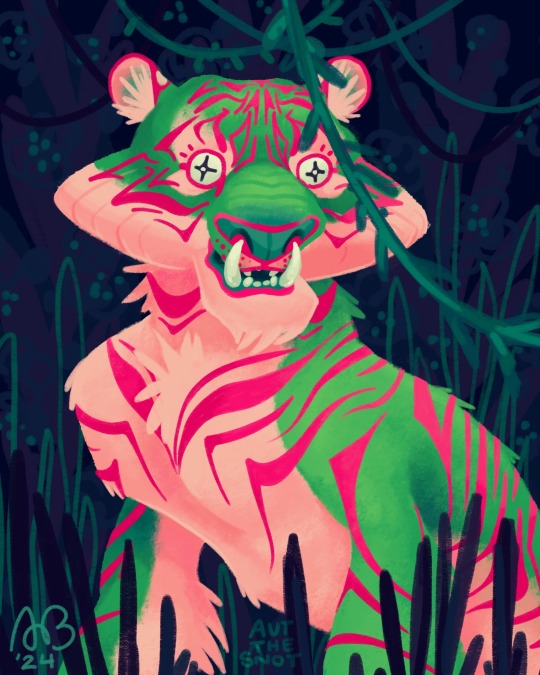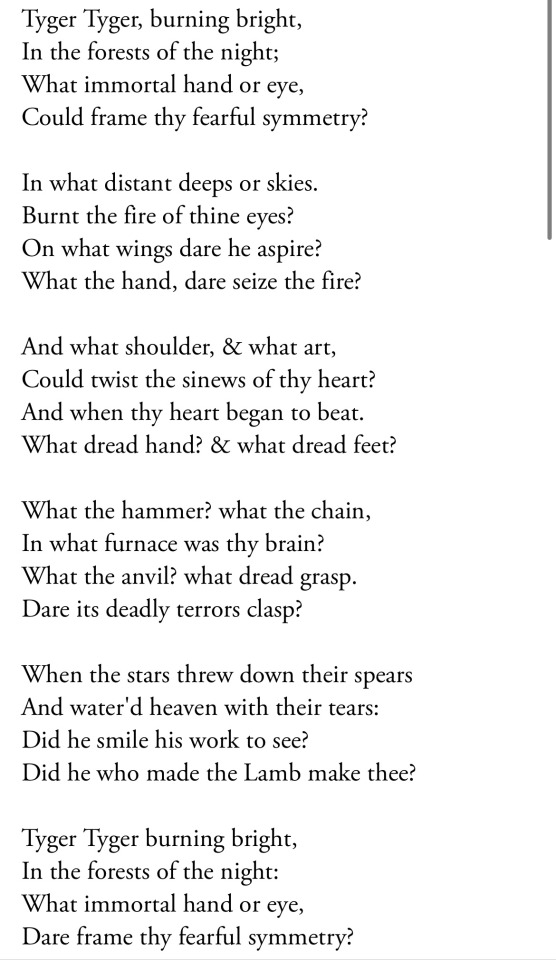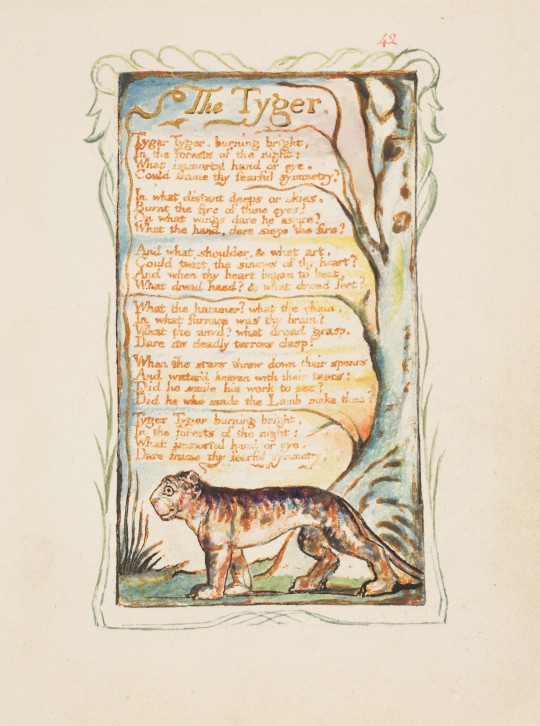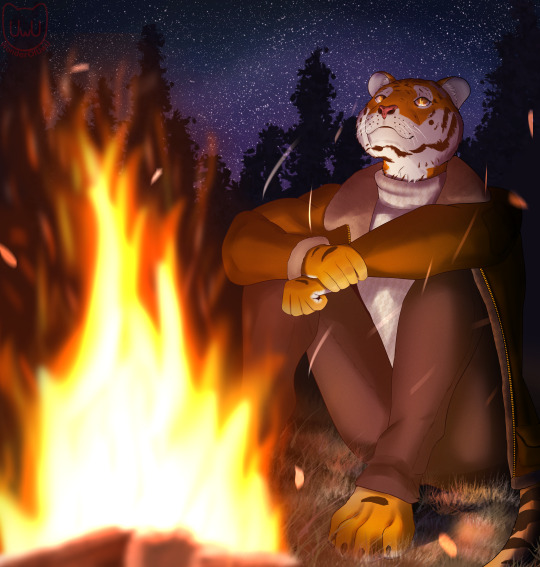#the tyger
Explore tagged Tumblr posts
Text

Tyger Tyger burning bright,
In the forests of the night:
What immortal hand or eye,
Dare frame thy fearful symmetry?
(William Blake, The Tyger)
#I tried to go outside of my style comfort zone#I like the result! definitely see how I could do it more efficiently next time#I’m honestly still learning how to use procreate as a system#I have a fairly basic grasp of digital art but there are a lot of tools I don’t understand beyond layers and alpha lock and clipping masks#illustration#art#drawing#painting#tiger#the tyger#William Blake#digital art#animal art#procreate#Tiger drawing#illustrator#digital painting
59 notes
·
View notes
Note
hiii ive been thinking abt it a lot recently,it's very much becoming my favourite poem (i have tied it to one of my favourite ocs its so over for me.) and now im wondering about what the meter for The Tyger by William Blake is? thank you :3 i also hope your day/night is going well
You know,I love The Tyger as well but it's been ages since I've thought about it. It's trochaic tetrameter catalectic! Some lines (like line 4) start with an extra unstressed syllable, arguably making those lines iambic instead.
– ◡ / – ◡ / – ◡ / – Tyger / Tyger, / burning / bright, – ◡ / – ◡ / – ◡ / – In the / forests / of the / night; – ◡ / – ◡ / – ◡ / – What im/mortal / hand or / eye, ◡ – / ◡ – / ◡ – / ◡ – Could frame / thy fear/ful sym/metry? – ◡ / – ◡ / – ◡ / – In what / distant / deeps or / skies. – ◡ / – ◡ / – ◡ / – Burnt the / fire / of thine / eyes? – ◡ / – ◡ / – ◡ / – On what / wings dare / he as/pire? – ◡ / – ◡ / – ◡ / – What the / hand, dare / seize the / fire?
etc.
Also there are a few points where IMO a meaningful word that you'd naturally emphasize goes in a syllable that should be unstressed, so the trochee gets read as a spondee. For example, I read the final line as
– – / ◡ – / ◡ – / ◡ – Dare frame / thy fear/ful sym/metry?
The same could apply to dare in line 8. But that might just be me!
#tyger tyger burning bright#the tyger#william blake#anonymous#requested#trochaic tetrameter catalectic#trochaic#tetrameter#iambic tetrameter#iambic
22 notes
·
View notes
Text










Tyger Tyger, burning bright,
In the forests of the night;
What immortal hand or eye,
Could frame thy fearful symmetry?
(i'm selling these zines for 3€ (+shipping). dm me if you'd like one!)
#the formatting on this is atrocious i'm really sorry#unfortunately this is quite ink-extensive and took me multiple weeks so i have to price these quite high#the tyger by mephisto walz has to be one of the most beautiful songs in all of goth music...#mephisto walz#william blake#the tyger#poetry#literature#zine#fan zine#zines on tumblr#goth#gothic#gothic art#artists on tumblr#dark art#gothic rock#synthlove27
22 notes
·
View notes
Text
Wake Up Babes, New Dream Quality Just Dropped


"The Forests of the Night", eh? As in
Tyger Tyger, burning bright,
In the forests of the night;
What immortal hand or eye,
Could frame thy fearful symmetry?
I see what you're doing there, @failbettergames.
And I like it.
#william blake#the tyger#fallen london#fallen london estival#fallen london dreams#having recurring dreams#the forests of the night#schroed's thoughts
25 notes
·
View notes
Text
Happy international Tiger day to all who celebrate 🧡






#I post therefore I am#Tiger#the tyger#calvin and hobbes#the Tiger rising#the lady or the tiger#tigger#life of pi#aesthetic#is this aesthetic?#I hope so
18 notes
·
View notes
Text

—The Tyger by William Blake
93 notes
·
View notes
Text








McGoohan cat meme is back with William Blake's The Tyger.
18 notes
·
View notes
Text
For #InternationalTigerDay 🐅 on #Caturday:

William Blake (British, 1757–1827) "The Tyger" Songs of Innocence and Experience (copy Y), plate 42 Date: [1794] printed ca. 1825 Relief etching printed in orange-brown ink and hand-colored with watercolor and shell gold 6 3/16 x 5 9/16 in. (15.7 x 14.1 cm) Metropolitan Museum of Art, New York 17.10.42
>One of Blake's best-known verses, "The Tyger," comes from the Songs of Innocence and of Experience. Blake originally produced this small, richly illustrated collection of short lyric verses as two separate books, in 1789 and 1794, then combined them into a single volume in the latter year. Although its small, colorful format recalls a children's book, its message is sophisticated and complex. Innocence and Experience contrast human existence, before and after the Fall. The pastoral poems in Innocence express religious faith and acceptance, and exhibit fine detail and flowing lines; the bardic verses in Experience, by contrast, convey disillusionment and anger, and employ bolder outlines. Published during the height of the Terror, the French Revolution left its mark on the second book.
Blake produced only twenty-four copies of the combined volume; this page comes from one of the last, prepared about 1825 for the painter and printmaker Edward Calvert (1799–1883). Its deep, saturated hues and distinctive ornamental borders (found on only one other copy) contrast with the lighter, paler colors of editions printed three decades earlier. The book remained in the Calvert family until the late nineteenth century; in 1917, it became the first work purchased for the Metropolitan Museum's new Department of Prints by its distinguished first curator, William M. Ivins, Jr.<
#animals in art#18th century art#19th century art#William Blake#The Tyger#British art#European art#book art#book illustration#illustration#print#Metropolitan Museum of Art New York#tiger#feline#Caturday#International Tiger Day#animal holiday
34 notes
·
View notes
Text

Tyger Tyger, burning bright,
In the forests of the night;
What immortal hand or eye,
Could frame thy fearful symmetry?
#furry#furry art#furry artist#furry artwork#anthro#anthro artist#anthro artwork#anthro art#digital art#digital artwork#wonderofuwu#tiger#furry fandom#the tyger#william blake
14 notes
·
View notes
Text
2 notes
·
View notes
Text
Tyger Tyger, burning bright,
In the forests of the night;
What immortal hand or eye,
Could frame thy fearful symmetry? ...
3 notes
·
View notes
Text
"When the stars threw down their spears / And water'd heaven with their tears: / Did he smile his work to see? / Did he who made the Lamb make thee?"
Read it here | Reblog for a larger sample size!
#closed polls#polls#poetry#poems#poetry polls#poets and writing#tumblr poetry#have you read this#the tyger#william blake
7 notes
·
View notes
Text
The Tyger - William Blake - UK
Tyger Tyger, burning bright,
In the forests of the night;
What immortal hand or eye,
Could frame thy fearful symmetry?
In what distant deeps or skies.
Burnt the fire of thine eyes?
On what wings dare he aspire?
What the hand, dare seize the fire?
And what shoulder, & what art,
Could twist the sinews of thy heart?
And when thy heart began to beat.
What dread hand? & what dread feet?
What the hammer? what the chain,
In what furnace was thy brain?
What the anvil? what dread grasp.
Dare its deadly terrors clasp?
When the stars threw down their spears
And water'd heaven with their tears:
Did he smile his work to see?
Did he who made the Lamb make thee?
Tyger Tyger burning bright,
In the forests of the night:
What immortal hand or eye,
Dare frame thy fearful symmetry?
14 notes
·
View notes
Text
The Tyger
BY WILLIAM BLAKE
Tyger Tyger, burning bright,
In the forests of the night;
What immortal hand or eye,
Could frame thy fearful symmetry?
In what distant deeps or skies.
Burnt the fire of thine eyes?
On what wings dare he aspire?
What the hand, dare seize the fire?
And what shoulder, & what art,
Could twist the sinews of thy heart?
And when thy heart began to beat.
What dread hand? & what dread feet?
What the hammer? what the chain,
In what furnace was thy brain?
What the anvil? what dread grasp.
Dare its deadly terrors clasp?
When the stars threw down their spears
And water'd heaven with their tears:
Did he smile his work to see?
Did he who made the Lamb make thee?
Tyger Tyger burning bright,
In the forests of the night:
What immortal hand or eye,
Dare frame thy fearful symmetry?
Blake, William. "The Tyger." Songs of Experience. Facsimile reproduction of the 1794 illuminated manuscript, published by The William Blake Trust and the Tate Gallery, 2009, in William Blake: The Complete Illuminated Books.
#english poetry#english literature#william blake#romanticism#poetry#literature#the tyger#songs of innocence and of experience#18th century#songs of experience#fav
6 notes
·
View notes
Text
Tyger Tyger, burning bright, In the forests of the night; What immortal hand or eye, Could frame thy fearful symmetry? In what distant deeps or skies. Burnt the fire of thine eyes? On what wings dare he aspire? What the hand, dare seize the fire? And what shoulder, & what art, Could twist the sinews of thy heart? And when thy heart began to beat. What dread hand? & what dread feet? What the hammer? what the chain, In what furnace was thy brain? What the anvil? what dread grasp. Dare its deadly terrors clasp? When the stars threw down their spears And water'd heaven with their tears: Did he smile his work to see? Did he who made the Lamb make thee? Tyger Tyger burning bright, In the forests of the night: What immortal hand or eye, Dare frame thy fearful symmetry?
"The Tyger." Songs of Experience, William Blake (1794)
12 notes
·
View notes
